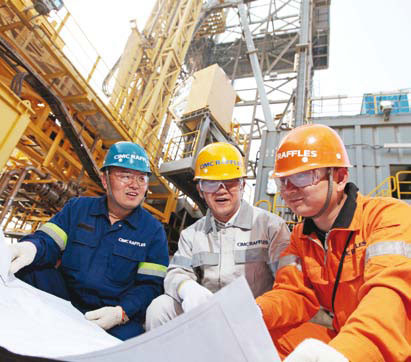
 |
| Rig builder CIMC Raffles is banking on winning more global orders to move up the value chain. (Photo/China Daily) |
But a lack of management skills is hampering progress
Not a single barrel of oil has been discovered in the deep waters off the coastline of Singapore, but the small country has managed to gain a leading position in rig building with more contracts than any other shipyard in the world.
However, boosted by newly acquired expertise, lower production costs and Beijing's strong desire to secure more offshore oil to better develop its marine economy, aspiring Chinese rig builders are gearing up to fight for more market share and seek to take the crown from offshore oil rig manufacturers in Singapore.
CIMC Raffles in Yantai, Shandong province, is one of them. Though it is relatively new to the sector, the offshore drilling rig builder, a subsidiary of China International Marine Containers (Group) Co in Shenzhen, has already learned a lot and expects to be making money in the next few years, the company says.
CIMC started to acquire stakes in Yantai Raffles Shipyard Ptd Ltd, a joint venture between the local government and a group of Singapore investors, in 2008 and later renamed the company CIMC Raffles. It now has almost total control.
"It has cost us a lot to learn over the past several years, but we've progressed rapidly," says Gao Shang, director of CIMC's offshore division.
"The company hopes to become a world leader and to move the axis of global offshore rig building from Singapore to China," Gao says.
It may seem like a long shot, but the company, with annual turnover of about $700 million (536 million euros), is betting its future on the country's low engineering costs with a new research and development building staffed by about 800 researchers and engineers that is due to open shortly.
"Rapidly rising labor costs may end China's days as the low-end manufacturer to the world," Gao says. "But the upgrade of China to become a high-end manufacturer is about to take off, thanks to the country's low-cost researchers and engineers."
In developed Asian countries such as Japan, the lowest annual salary of an engineer can be as high as $50,000, but in the company's headquarters in Yantai, an engineer is paid less than $20,000, he says.
"That is China's biggest advantage in offshore rig building. I can't see why it can't overtake Singapore to become the world No 1."
However, even with its advantages of low costs and increasing orders resulting from robust offshore oil activity, the company has been losing money.
The company registered a loss of 1.1 billion yuan ($176 million; 135 million euros) in 2011, according to its financial report. Gao says it lost a lot less last year, but would provide no more detail.
The company has delivered all kinds of giant rigs since late 2010, from semi-submersible drilling platforms, pipe-laying vessels, to self-elevating drilling units, and, recently, a semi-submersible accommodation vessel as big as a football field for more than 500 people, but how to deliver those rigs on time to avoid financial losses has been a big challenge, Gao says.

















 China's social trust index declined further last year, according to the Annual Report on Social Mentality of China 2012
China's social trust index declined further last year, according to the Annual Report on Social Mentality of China 2012


![]()
